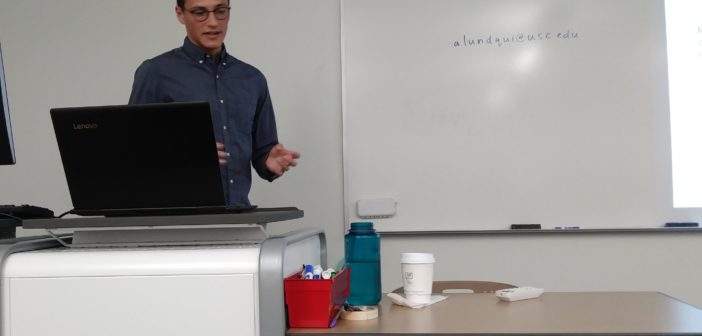Alumnus Adam Lundquist returned to campus May 4 to discuss his current graduate-level research focusing on exercise and Parkinson’s disease.
Lundquist, ’16, started his undergraduate studies at Yale University as a molecular biology major and then transferred to North Central after his first year, where he became a biology major and neuroscience minor.
Originally, Lundquist was interested in going to medical school but then decided that research was the path for him. During his undergrad, Lundquist was accepted to conduct research at Gladstone Institute of Neurological Disease in San Francisco, Calif., where he spent two summers working with neurodegeneration and glial cells to better understand Alzheimer’s disease. Shortly after, he received a Richter Grant to research drug addiction.
After graduation, Lundquist went on to study neuroscience at the University of Southern California and is currently at the end of his second year there, where he is one out of about 85 other graduate students in the neurology department, the largest department at the university.
Lundquist’s current research is about “characterizing the astrocytic and neuroenergetic response to exercise-induced neuroplasticity,” which means he is studying the effect of exercise on the brain, particularly on someone who has Parkinson’s disease.
Lundquist is looking at how exercise improves motor behavior in someone who has Parkinson’s disease. “Studies have shown that exercise seems to be neuroprotective in some sense, is doing something to the brain that helps to either resist the onset of Parkinson’s disease or decrease the amount of damage that Parkinson’s disease does when you model it in animals,” Lundquist said.
For example, Lundquist and his colleagues have studied Parkinson’s disease-like symptoms in mice and have tested their motor abilities. He jokes that “not all science is pretty,” in regards to watching mice run on treadmills all day.
Lundquist reflected on his research experiences and says that there are many research opportunities available for inexperienced undergraduate students, but that they may not be easy to find. “Email is your best friend, so learn how to write a well-informed email,” he said.
He also said that success in the lab as a researcher is almost entirely independent of success in the classroom. “You can be a great scientist without being a stellar student,” Lundquist said. “So much more of it is just more than knowledge, it’s knowing how to be creative, how to problem solve, how to be persistent.”
Although Lundquist graduated with a 3.1 GPA and had C’s in several science classes, he has been successful as a graduate student and has been published in “Nature” and “Neuroscience.”
“Your grades are not indicative on your ability to be a good scientist,” Lundquist said. Also, “don’t let a bad lab experience ruin your love for science. Never let that take away your ability to be awestruck by science.”

